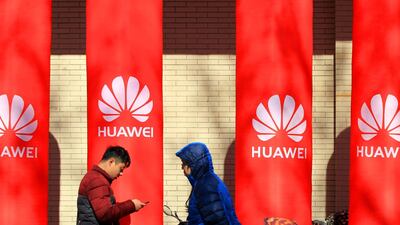The Donald Trump administration is using Huawei as a "bargaining chip" in trade talks with China, but targeting the company risks a strong response from Beijing that would hamper the growth of US technology firms, according to analysts.
"Trump is aware that Huawei represents a major bargaining chip in the negotiations," Matthew Kendall, chief telecoms analyst at the Economist Intelligence Unit, told The National. "[But] there is a significant prospect of retaliation … with the Chinese perhaps looking to target a [US] company such as Apple."
China is one of Apple’s biggest markets and the country is the main manufacturing base of Apple products like the iPhone, MacBook and iPad. A clear indication of Apple’s exposure to the Chinese market came in January when the California-based company said a weaker Chinese economy would affect it sales numbers. The company’s stock price plunged 8 per cent at the time.
Mr Trump blacklisted Huawei last week through an executive order, forbidding US companies from doing business with the Chinese telecom giant. With no alternative, US technology companies complied. On Monday however, the White House backtracked on the immediate banning of Huawei, granting the company a three-month reprieve after US technology stocks tanked.
Neil Campling of Mirabaud Securities told The National that Cupertino-based Apple is one of the most "exposed" American firms to Chinese retaliation.
“Apple certainly has many things to worry about. I do not think China will go for an outright ban on Apple products but it could hit it with increased tariffs,” Mr Campling said.
Chinese media has also been vocal on the China-US trade spat and it can effectively move Chinese consumers to shun Apple, said Mr Campling, adding, “If the Chinese decide not to buy Apple products, it will reflect badly on the company’s bottom line.”
In the first six months of the financial year 2019-20, ending March 31, Apple lost nearly $7.6 billion (Dh27.9bn) in revenue yearly from the Greater China market.
Industry experts said that while the spotlight of the US-China trade war is predominantly on Huawei right now, the attention will soon be on American firms.
"If no amicable solution is reached, then problems will extend not only to Apple but to US component manufacturers [Intel, Qualcomm, Broadcom and Xilinx] as well," Tarun Pathak, an associate director at Hong Kong-headquartered research firm Counterpoint, told The National.
Restrictions on Huawei will encourage the company to "double its efforts" in driving domestic sales - where just over half of its consumer revenue already comes from - and this will come at the expense of Apple, which Mr Pathak said is the only non-Chinese brand "doing well in China at the moment".
Huawei shot to the centre of the US-China dispute last December, when its chief financial officer Meng Wanzhou was detained in Canada on a US warrant. Authorities concluded she had played a close role in Huawei’s Iran business, including misleading banks and others about the extent of it. The company, its US subsidiary and Ms Meng were indicted by federal prosecutors in Brooklyn in January.
In March, Huawei also filed suit against the US government in a Texas court, challenging the constitutionality of an American law that restricts the Chinese company from doing business in the country.
The US going after Huawei is politically motivated and the long-term risk is a technology war, which could have a significant impact on supply chains, according to analysts.
"Of all the sectors that the US-China trade war is hitting, the high-tech industry has become the most strategically consequential," Sam Blatteis, chief executive of The Mena Catalysts, which advises technology companies on policy and government affairs in the region, told The National.
The US move to blacklist the Chinese company shows how government relations are increasingly "more important" than business in shaping market outcomes, said Mr Blatteis, adding that the US cannot afford to curtail Huawei for long.
Huawei equipment is set to be used on a vast scale in implementing the next-generation 5G wireless network - powering the global economy once it comes online with everything from self-driving cars to surgeons relying on it. Blacklisting Huawei puts the future of 5G on unclear footing, analysts said.
“Stakes are high … Huawei is the world’s largest telecom equipment maker, employs 180,000 people - more than American Airlines and United Airlines combined - 80,000 of which are now involved in R&D," said Mr Blatteis.


